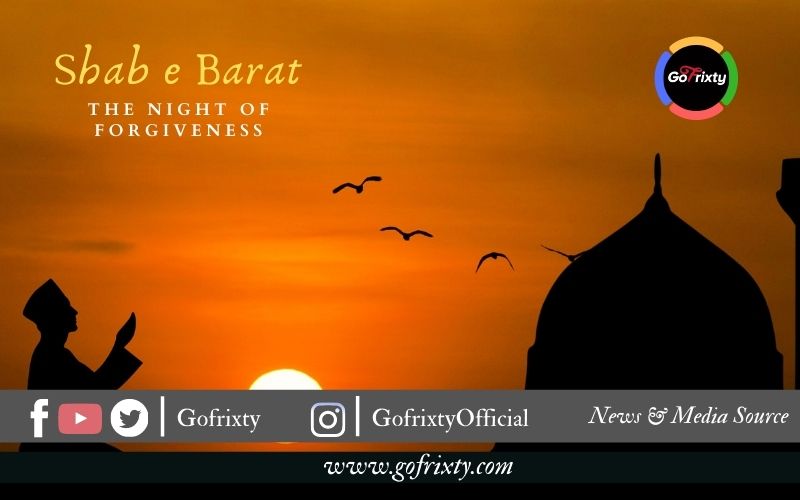Shab e Barat also written as Shab-e-Brat (night of forgiveness) is one of the Holy nights in Islam. Muslims observe Shab-e-Barat on the 15th of Shuban (the 8th month of Islamic lunar calendar). It is often quoted by Islamic scholars that In this night, the fortune of every creature has been decided by Almighty Allah. People also pray to Almighty Allah for forgiveness as this night is also called one of the merciful nights in Islamic history.
When Shab-e-Barat is observed?
Islamic lunar calendar is based on the appearance of the moon. So, there are either 29 or 30 days in every month of the Islamic calendar. Similarly, Shuban which is the 8th month in the Islamic calendar also has either 29 or 30 days. Normally, the new date begins after midnight. But in the Islamic calendar, a new date begins with the appearance of the moon just at the time when the sun falls.
Therefore, Shab-e-Barat is observed in the mid of Shuban month (15th Shuban) every year. And the 15th Shuban starts at the time of sunset of 14th Shuban and being observed in the whole night.
What are Muslims common practices on Shab-e-Barat?
Muslims believes that on the eve of Shab-e-Barat, the fortunes of all creatures are being decided by Almighty Allah. Also, all the deeds are submitted from the previous year. Therefore, Muslims observe this night as blessings of Almighty Allah and most of them pray to ask for forgiveness and mercy from Allah Almighty. Shab-e-Barat is also named the night of forgiveness.
Watch Hagia Sophia | After 86 years, Islamic prayers to start
People have their traditions and customs to observe this night. In Arab countries, this night is named ‘Laylatul Bara’ah or Laylatun Nisfe min Sha’ban’. In most of the regions around the globe, people used to observe this night quietly and calmly. Most of them offer prayers, ask Allah Almighty for forgiveness, and look towards their neighbours and feed the poor ones. Whereas, in Pakistan, particularly in Sindh province, it is also often called (Phatakan wari Eid) an Eid to have firework. People used to cook some delicious dishes at their homes and they share on this night. Some of them offer the Nwafil prayers and recite Qur’an and ask Allah Almighty for forgiveness.
Qur’an & Sunnah about Shab e Barat
The majority of the Qur’an Tafsir scholars have revealed that there is nothing such superstitious mentioned in the Qur’an about Shab e Barat. Though, there is evidence in some of the Ahadith, which speaks about this night. But, according to Muhaddithin these Ahadith are weak (Da’if) and have not that much significance in the lives of humanity. Some of these Ahadith are bellowed.
Aisha [May Allah be pleased with her] reports I missed the Prophet one night so I went out to al-Baqi` (and found him). He said: “Were you afraid that Allah would wrong you and that His Prophet would wrong you?” I said: “O Messenger of Allah, I thought that you might have gone to visit one of your wives.” He said: “Allah Glorious and Exalted descends to the nearest heaven on the night of mid-Shaban and He forgives to more people than the number of hairs on the hides of the sheep of the tribes of Kalb.
Narrated from Aisha by Ahmad, Ibn Majah, and al-Tirmidhi who said that he heard al-Bukhari grading this Hadith as weak because some of the sub-narrators did not narrate directly from each other.
Abd Allah ibn `Amr [May Allah be pleased with him] reports that Prophet [Peace be upon him] said “Allah looks upon His creatures on the night of mid-Shaban and He forgives all His servants except two: one intent on hatred, and the homicide.”
Narrated from Abd Allah ibn Amr by al-Tirmidhi, Ahmad and al Bazzar with a chain he graded fair (Hasan) through the great Tabi’I jurist al-Qasim ibn Muhammad ibn bi Bakr al-Siddiq.
Read About Ethics and The Life of Prophet Mohammad ﷺ
Narrated from Aisha by al-Bayhaqi in Shu’ab al Iman (3:382) where he comments: “This hadith is missing the Companion in its chain, and is a good Hadith (hadha mursal jayyid). It is probable that al-Ala’ibn al-Harith took it from Makhul and Allah knows best.”
Ali ibn Abi Talib [May Allah be pleased with him] reports that the Prophet [Peace be upon him] is reported to have said: “The night of mid-Shaban, let all of you spend in prayer and its day in fasting, for Allah descends to the nearest heaven during that night beginning with sunset and says: ‘Is there no one asking sustenance that I may forgive them? Is there no one asking sustenance that I may grant them sustenance? Is there no one under duress that I may relieve them? Is there not such-and-such, is there not such-and-such, a so forth until dawn rises”
Advertisement
Read more: 7 deeds you must do in the last Ashra of Ramadan
Narrated from Ali by Ahmed and Ibn Majah with a chain containing Ibn Abi Sabra, Mufti Taqi Uthmani says regarding the authenticity of this hadith This Hadith is recorded by Ibn Majah in his Sunan, one of the famous six books of Hadith, and also by Baihaqi in his famous book Shu’ab-al-‘iman’. Both of them have reported it without any comment about its authenticity. But after a critical analysis of its chain of narrators it is found that this tradition is mainly based on the report of Abu Bakr Ibn Abi Saburah whose narrations cannot be relied upon. That is why the scholars of Hadith have declared it as a weak (da’if) tradition. his memory was not of the standard required for the Authenticity of a tradition. That is why most of the critics and scholars of Hadith like Imam Bukhari etc. Have held him as weak.
Some misconceptions about Shab e Barat
There no such evidence has been identified from Qur’an about this night. But, there are some Da’if Ahadith about this night. But this doesn’t mean to believe in some superstitions like people believe that the spirits of the dead pay visit to their relatives on this night. Some people believe that the names of human beings are written on a special tree in heaven, and those leaves which are dropped will die in this year. This means the destination of life and death is written on this night etc. These beliefs are superstitious as they are not authenticated with the teachings of the Qur’an and Sunnah.
Conclusion
There is no specific prescribed Ibadat that have been suggested in Shariah for Shab e Barat. Prophet Muhammad ﷺ used to perform ibadah in the last portion of every night. This noble habit of Prophet Muhammad ﷺ has been practised by his Ummah as Nawafil Ibadah. It provides a real pleasure to the heart and soul of human beings.
Ayesha (RTA) reports that Prophet Muhammad ﷺ used to go to bed during the first portion of the night and he would stay awake the last portion of the night (spending it in ibadah). (Bukhari and Muslim)
The beliefs about fasting on Shab e Barat has also not been proved from Qur’an and Sunnah. Though, there is a hadith which quotes that it was a common practice of Prophet Muhammad ﷺ fasting on every 13th, 14th, and 15th of the lunar month (Narrated by al-Bukhârî, no. 1833; Muslim, no. 1956). The fasting has not proved to be specified on only 15th Sha’ban.
In Qur’an, the blessed night is mentioned and that is only one “Laialt-ul-Qadr”. The Lailat-ul-Qadr is a night on which the verses of the Holy Book “Al-Qura’an” was descended on the Holy Prophet Muhammad ﷺ. In Islamic literature, it is mentioned that the Lailat-ul-Qadr is better than the thousands of other nights. This night gives immense spirituality and power to be very close to the ALLAH Almighty. This is also named the night of power. It’s believed that this night occurs on 27th Ramadan, but the literature says that to find the Lailat-ul-Qadr you need to search it on odd-nights of the last Ashra of Holy month Ramadan.
AND ALLAH KNOWS THE BEST.‘JAZAKALLAH KHAIR’
Passive Earning Review → Coin Farm | Play to earn crypto games for handsome passive earning





[…] What is Shab e Barat? Its importance in Islam […]
You are my aspiration, I have few blogs and often run out from to post.
[…] What is Shab e Barat? Its importance in Islam […]
Thanks for sharing, this is a fantastic blog. Much thanks again. Fantastic.
I’m thankful for the post. Really looking forward to reading more. Really Great.